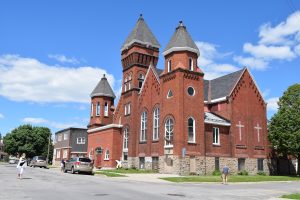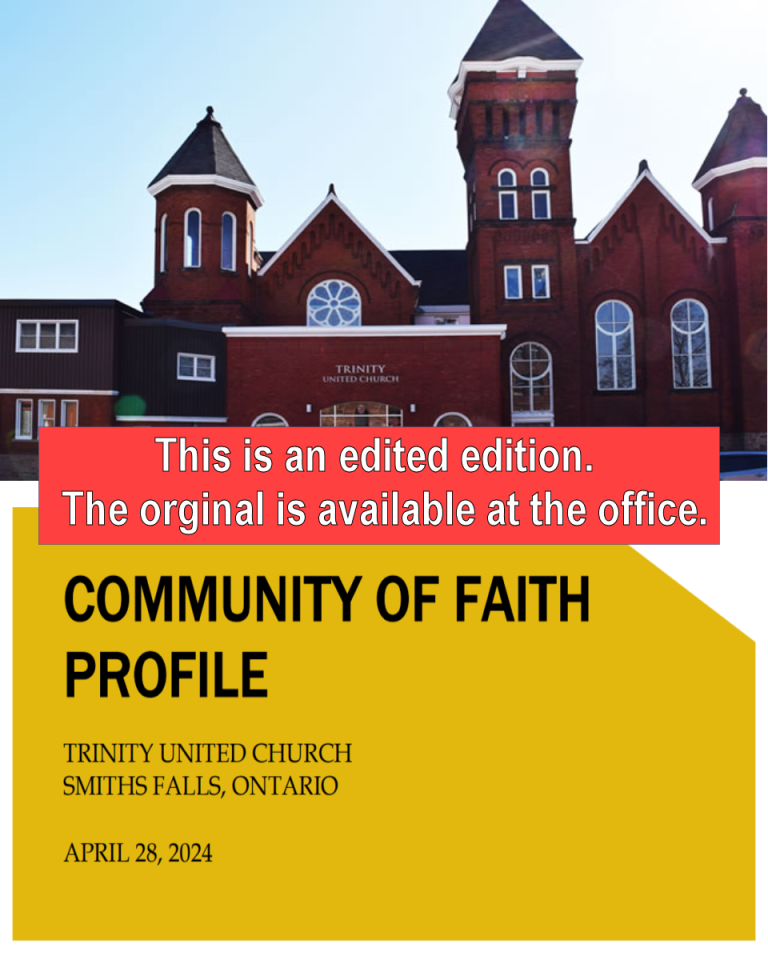
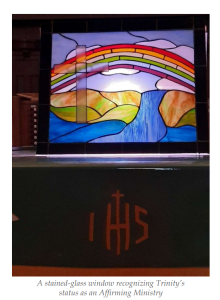

With our Call Statement of Connect, Inspire and Serve
and our three core practices of hospitality, justice, and diversity,
as well as Jesus’ teaching to “love one another”, Trinity United Church
embraces a form of spirituality that many outside the church seem to be seeking.
Trinity is in a period of transition. With our long-standing and respected Minister entering retirement and a congregation regaining momentum after the COVID-19 pandemic, Trinity is excited to be defining its Living Faith Story in 2024.
Throughout 2023, Trinity undertook an extensive visioning process facilitated by the United Church. While Trinity is reaching the end of this work, it is now in a place where the vision can be put into action. This process has identified hospitality, justice, and diversity as three core practices Trinity wishes to focus on in the coming years. Trinity is looking for Ministerial leadership to help bring these concepts to life.
Trinity is an active congregation that is willing to experiment and explore. When members of the church take on an initiative, the results of their efforts often expand beyond expectations and new possibilities are discovered.
For example, a “Trinity on Tuesdays” meal that regularly brought members of the congregation together with others in the community quickly changed to provide meals during the COVID-19 pandemic. With the pandemic having receded, Tuesday meals have returned to Trinity with “Potlucks and Praise”.
Similarly, Trinity’s long-standing book club that focuses on examining Christian-themed fiction has prompted a wider interest in a variety of spiritual practices and forms of prayer. Current investigations include deep, open, and honest conversations about mental health.
Trinity seeks to live out its faith in service to the wider community. Trinity is situated in Smiths Falls, a small community in transition that is experiencing growth, in which the church community leads and supports on a number of social initiatives in line with its core principles. The tendency at Trinity is that someone notices a need in the wider community – be that a need for environmental action, food security, Indigenous reconciliation, or preventative health measures – then brings together a few others to meet that need. Once that project is up and running it tends to then be handed over to others outside the church community to continue with the work – we have often been the first runners in many-a-relay.
Our community of faith fosters Christ-like acts in ourselves and others through practices to restore wholeness, balance and harmony and has sought ways of being individually connected to God. Trinity’s Living Faith Story is animated, ambitious, and active. Building on its strong foundations and its growing momentum emerging from the COVID-19 pandemic, Trinity is seeking Ministerial support and leadership to help meet the aspirations of its vision and to further realize its potential.
While Trinity United has a long and proud history and a promising future, it was strongly affected by the COVID-19 pandemic. As the pandemic unfolded in early 2020, Trinity entered a challenging period that has lingered into the present day. Many priorities that had been outlined before the pandemic struck faced setbacks. Goals for greater engagement of youth and families to help sustain and grow the congregation, among other important and promising initiatives that were also relevant to the broader community, needed to be paused. While blessed with robust financial reserves and investments, meeting operating costs from within the active congregation increasingly became a challenge. Rebuilding and moving forward has taken time and effort.
However, in the depths of the pandemic, Trinity’s faith, and its commitment to aiding in the community shone brightly. Trinity’s response to the COVID-19 pandemic embodied its Call Statement to Connect, Inspire, and Serve. Its actions also lived out its now-defined vision and practices of hospitality, justice, and diversity. While the pandemic was tragic on a societal scale, passing through this period has likely been a defining driver of Trinity’s Living Faith Story (as articulated in early 2024).
At the point of greatest uncertainty and risk in the early part of the pandemic, Trinity responded in several ways. This included continuing to care for our church community with bimonthly phone calls, monthly mail-outs of activity packages for children, and food drop-offs for the elderly. This eventually transitioned to learning and adapting to use new technologies to reach the congregation virtually.
Trinity also whole-heartedly embraced the concerns of the Smiths Falls area. Over 4,000 cloth masks were sewn and distributed throughout the community by members of the congregation in the days when masks were not commercially available. Starting from a grass-roots initiative, a “Brown Bags and Blessings” initiative was launched to provide take-away lunches and blessings to those most in need in our community. This successful program leveraged grants and donations to provide approximately 12,000 meals, while supporting local small businesses at the same time. Trinity’s work also led to extensive positive media coverage.
“Brown Bags and Blessings” also helped demonstrate a broader need for sustainable food security in our community. Trinity, along with various churches, municipal leaders, and non-profit organizations have been working towards establishing a municipal food hub to address a significant social need.
Finally, when it became safe for groups of people to assemble again, Trinity held a Seniors’ Reunion and welcomed folks from near and far to reunite with their old friends. It was a most heart-warming event that went a long way to overcoming fear and isolation. While the COVID-19 pandemic represented a crisis, how Trinity responded is indicative of its core values and practice of faith, which we hope will continue.
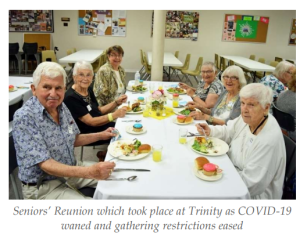
An in-depth 2023 visioning process identified that Trinity wishes to use our values of connection, inspiration, and service to guide communications, faith development, leadership, and participation in the community. Maintaining our commitment to inclusivity, accessibility, and growth will be important, as well as affirming all gifts and ways of being, are major themes that came out in the visioning work. This was a proactive approach designed to identify and tackle a set of important challenges for the church, as well as define a positive vision towards which to strive.
Visioning reinforced that Trinity is a faith-based community group that wishes to foster an intergenerational safe space. It is a hospitable and affirming Christian community that fosters justice and diversity. Trinity committed to invest in and deploy its full assets to support its vision, be they physical, individual, associational, institution, or financial.
This Living Faith Story is a culmination of a visioning process that identifies the core practice areas that Trinity wishes to follow in the coming years - hospitality, justice, and diversity. As such, the following sections will provide greater detail on these practices and how they connect to Trinity’s core values and demonstrate its active faith.
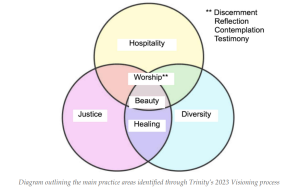
Hospitality is a way of caring for all God’s children. It is welcoming strangers into community. It is a central practice of faith that is done for its own sake, not to recruit new members. As a follower of Christ, one will sometimes be a host, sometimes the guest. Christian hospitality changes both the host and the guest. It is a way of overcoming fear and isolation. Hospitality is a major theme behind Trinity’s outreach.
As Trinity’s sense of hospitality shone through during the pandemic, it is also part of the church’s day-to-day culture. For example, Trinity has placed a strong emphasis on accessibility to ensure that all are welcome at church. Our sanctuary, dining hall and washrooms are accessible to all via an elevator, and we have recently adjusted the placement of pews to accommodate wheelchairs and other mobility devices.
In addition, Trinity’s United Church Women (UCW) organization is an integral part of fostering hospitality in our community and beyond. This has included comforting children by knitting “Izzy” dolls – toys sent to children in need in memory of Master Cpl. Mark (Izzy) Isfeld. In addition, the UCW has raised funds to send children to camp, marching in peace walks, supporting a women’s shelter, and contributing to the financial sustainability of the church with their provision of funds from various participatory fundraising efforts in the community.
Trinity also holds a monthly “Potluck and Praise” meal and worship service, offers an extensive array of treats after the Sunday worship service so the congregation can gather, and provides nourishment for many gatherings as well as funerals. Knowing that hospitality extends beyond food, we attempt to use our Facebook page as a way of sharing messages of encouragement and hope, and welcoming the corresponding responses.
Trinity extends this hospitality outside of the physical church walls. Once a month, we hold a worship service and communion at a local retirement home. We are also faithful in sending out Christmas cards and other encouragement cards.
Trinity’s hospitality also extends to the children in our Sunday School (which currently operates two Sundays per month), as well as through Vacation Bible School, which we share with the United Churches in Perth and Carleton Place (“Camp Awesome”). Children are a part of the church family, and Trinity’s visioning processes identified working with youth to be an important objective moving forward.
“For I was hungry and you gave me food,
I was thirsty and you gave me drink,
I was a stranger and you welcomed me.”
~ Matthew 25:35~
Trinity also offers hospitality through prayer in various forms. Members of the congregation lead a prayer shawl Ministry, extending our love and encouragement. This includes youth venturing off to university far afield, those with newborn children, and those going through difficult times nearer to home.
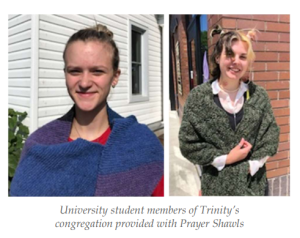
Trinity also offers a Healing Pathway – a recognized United Church Ministry of energy based healing offered within a heart-centred, inclusive community. Healing Pathway is currently offered once a month in the chapel of our sanctuary, and once a month in a neighbouring United Church. Soaking Prayer – a way of providing a shorter, one-on one focus on the needs of the receiver – is often offered in the chapel after worship. With the tragic deaths of family members of a few in our congregation this past year, a Grief Support Group was also offered. All three practices are hospitable acts of accompanying others on their respective journeys.
Trinity’s visioning process also identified the importance of partnerships as an offering of hospitality. This includes opening up the church space to community groups, including Alcoholics Anonymous (AA). The Spiritual Leadership Team is looking to reengage in pre-pandemic discussions with Big Brothers Big Sisters of Lanark County to make use of church recreational space to host youth groups.
We understand that to be truly hospitable we need to ask those we host or those who are just curious, what it is they require of us. We know we could improve on our efforts and build on our strong foundations and values to offer hospitality as a key component of our Living Faith Story.
Trinity values diversity in part because it reflects God’s love for all humanity. Diversity upholds the principle that despite our differences, we will be transformed by love. The congregation has taken strides towards embracing diversity and wishes to deepen this practice over the medium term. Trinity has placed a strong emphasis on diversity efforts around Indigenous Reconciliation, its status as an Affirming Congregation, and encouraging greater belonging.
Indigenous Reconciliation: Every Sunday morning as we read our Land Acknowledgement, we are reminded of our need to exercise the Ministry of Reconciliation with our Indigenous friends and neighbours. Steps we have taken in this direction include showing movies such as “Indian Horse”, honouring Indigenous Sunday and National Reconciliation Day, and hosting a monthly Drumming Circle. The latter brings together those of Indigenous and Settler ancestry to smudge, pray, share, and connect with their souls through drumming. In addition, Trinity recently contributed 10% of the proceeds of a significant land sale to support Indigenous ministries within the United Church.
Finally, a little red dress hangs in our sanctuary. It was donated by an Indigenous member of our congregation to remind us of missing and murdered Indigenous women and children. A red dress ceremony is held every May 5th off-site. This year we are planning, with the Presbyterian church, to have a reading of names and a ringing of the church bells for every person on that list. Trinity continues to seek ways to promote Indigenous Reconciliation through its practice of faith.
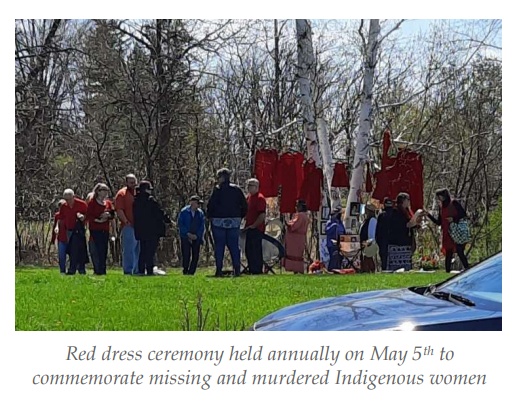
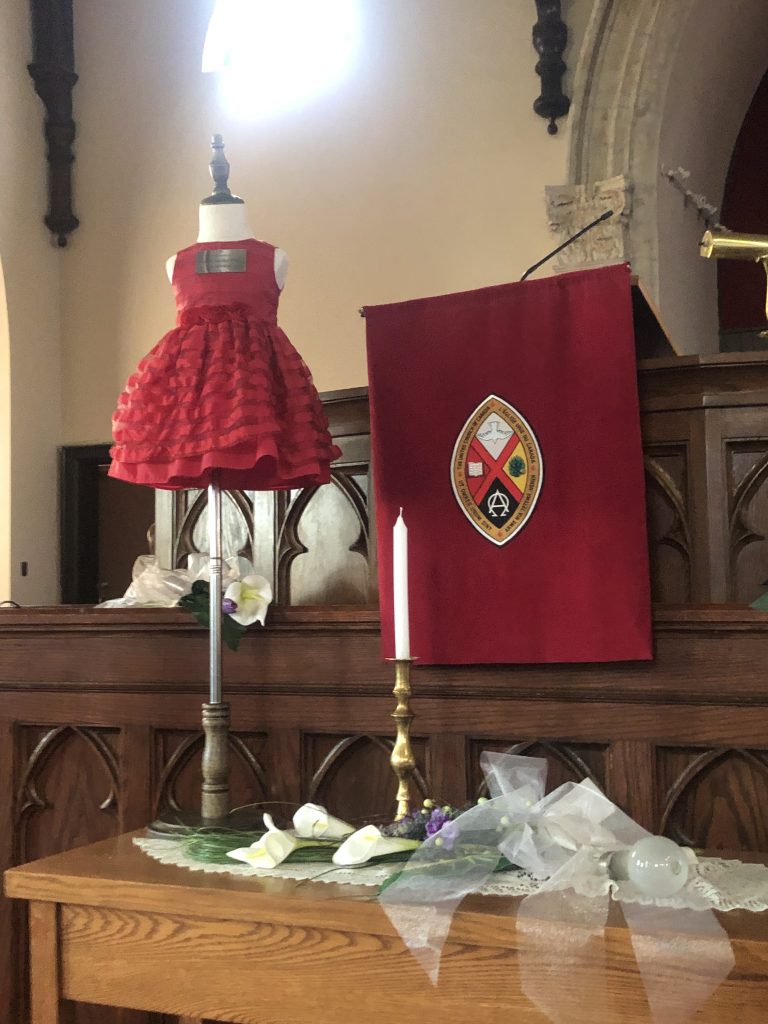
Affirming Congregation and Supporting the 2SLGBTQ+ Community: Trinity is an Affirming Congregation actively working within the community. We participated in the very first Pride Parade in Smiths Falls 2018 and initiated actions that led to the painting of two Progressive crosswalks in Smiths Falls for Pride 2023. At Trinity we have a Memorial Stained-Glass Rainbow window, and we fly our Rainbow Flags.
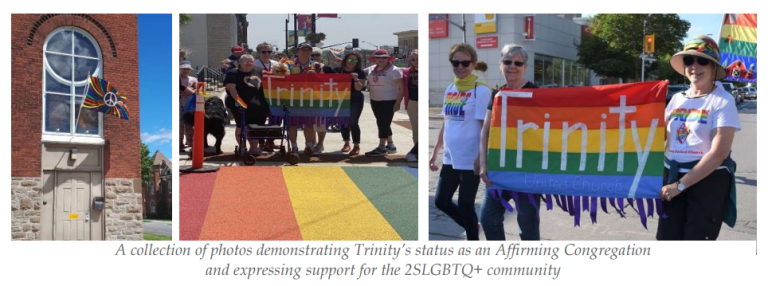
Other initiatives include PIE Day (Public, Intentional, and Explicit inclusion of 2SLGBTQ+), which is an annual event that normally involves eating pie and highlights the concerns of the 2SLGBTQ+ community. This year though, we displayed a variety of inclusive rainbow flags and handed out tarts at the public gazebo near the Smiths Falls Town Hall.
We also host Rainbow 101, a space where understanding and education come together to challenge views and change perspectives, while building a safe place for conversation. Rainbow 101 facilitators animate a number of topics for discussion and invite guest speakers. This initiative welcomes all people, and a major focus is on promoting understanding and inclusive thinking and learning.
The Belonging Project: The importance of belonging in our current disconnected world has been reinforced through a dedicated project focused on practicing the skills of belonging itself. Through dedicated learnings, the “Belonging Project” has engaged individuals within and outside of the church to practice non-violent communication. This includes learning how to communicate difficult things to others, skillfully receiving the difficult things others have to say to us, listening to our own hearts, and connecting with what really matters along with our neighbours. We know these skills will serve us as we welcome diversity in our midst and seek justice.
To encourage belonging, we include information on significant multi-faith celebrations with Regional and Ecumenical Prayer Intentions in the church bulletin and media. This is an example of a broader effort to build diversity into the core practices of Trinity.
Social Justice
Trinity’s visioning process has identified the importance of the practice of justice as outlined in the following Biblical teaching:
“What does the Lord require of you but to do justice,
and to love kindness, and to walk humbly with your God?”
~ Micah 6:8~
Trinity’s Living Faith Story recognizes the importance of Christian justice as a spiritual journey of compassion that is enacted. Christians enact justice through practices of hospitality, prayer, discernment, testimony, and diversity. In this way, justice is integrated into all we do. For example, the practice of justice is integrated into efforts to promote hospitality (e.g., Brown Bags and Blessings and food security) and diversity (e.g., Indigenous Reconciliation, supporting the 2SLGBTQ+ community). Additional important areas of focus have been on supporting victims of domestic violence and promoting environmental and ecological justice.
Supporting Victims of Domestic Violence: Trinity has long supported the Lanark County Interval House and Community Support organization, which offers emergency and on-going programs to women and children living in or escaping from domestic violence. This includes supporting Interval House’s shelter program, which provides emergency housing for women and their children through the regular collection of donations (funds and goods) in support of their work. Trinity has also welcomed the executive director of Interval House each year as a guest speaker in a worship service.
Promoting Environmental and Ecological Justice: Trinity has been long involved in environmental and ecological justice – promoting initiatives that address environmental injustice (e.g., where poor or marginalized communities are harmed by problems like pollution). We have provided a place for community members to bring recyclable items long before the municipality had a recycling program. Members of our congregation founded the Rideau Environmental Action League or REAL (www.realaction.ca) in 1989. Our annual mushroom compost sale is a collaborative effort with REAL and an important fundraiser for the church.
Trinity has also taken initiative to reduce its own environmental footprint. For example, a recent energy audit and retrofit now has the church equipped with energy-efficient light bulbs, a new front door, and a freshly insulated sanctuary and towers.
Justice and social justice are strong driving forces behind many of Trinity’s efforts in the community. In addition, the principal of justice forms a core practice of faith within Trinity’s church and congregation. This combination of spiritual and practical demonstrations of faith are critical elements that make up the fabric of Trinity United.
How We Sustain Our Community of Faith
Sustainability in a community of faith context is a complex idea. It includes a mix of spiritual leadership and practice, maintaining a physical church, fostering community, and managing human resources and financial assets, among other factors.
Trinity’s Minister and a wide range of individuals from the congregation have played critical roles in fostering sustainability in our church. This section of the Living Faith Story provides more details on these practical and critical functions.
Worship: Our weekly Sunday worship service and additional services aligned with important events in the Christian calendar provide ways of connecting us to one another, prompting reflection, and inspiring us. The investment of time and care of Trinity’s Minister is integral to success on this front. The value of these services is not to be underestimated, as it anchors the congregation to its core values and culture. As an added benefit, a member of Trinity is a Licensed Lay Worship Leader and is very active and appreciated in the life of the church. Trinity has also partnered with the Presbyterian Church in Smiths Falls to provide joint summer services, as well as other collaborations throughout the year.
Trinity worship services are supported and enabled by technology. Trinity’s events, history and values are communicated through all avenues of media. “Proclaim” software and other digital technologies have been purchased, along with projection displays. Skilled technologists produce the order of service, hymns, scripture, and prayers, as well as announcements on screen. The service is also provided online for those unable to attend in person and communicated over social media (e.g., Trinity’s Facebook page and YouTube).
Children also form an important part of the church service. Sunday School begins in the upper room during the service. The children come down at the end of their session, during children’s time to let all the congregation know what they have learned that day.
Music at Trinity: Music is at the core of Trinity’s culture, playing a key role in worship services, but also in bringing the community to Trinity for fundraising concerts and other events.
Music is an integral part of our worship services and is provided by our very talented organist and choir. Music has formed a strong part of the way Trinity practices its faith. We appreciate a mixture of rousing, uplifting as well as traditional music and hymns, and are willing to learn new music and try new things. We have enjoyed a range of musical styles, including contemporary, gospel, jazz, country, and choral music.
Trinity has hosted a range of concerts to help fundraise for the church and provide a high-quality music venue with incredible acoustics for artists, including the Barrel Boys – a bluegrass band with a national following that has become a local fixture, hosting an annual Christmas concert at Trinity and sometimes participating in worship services.
Check out our EVENTS PAGE for more information.
Church and Sanctuary: The physical space of Trinity United – our church and sanctuary – are assets for which the congregation is immensely proud. The physical church has been changing and expanding since the first portion of the present building was constructed in 1885 to accommodate a growing Methodist church.
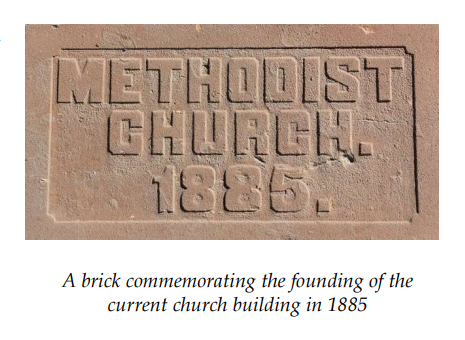
We love our sanctuary, which underwent a massive renovation between July 2023 and February 2024. This was the second major renovation in recent years – putting this historic building on solid footing to be used long into the future – to serve Trinity’s Community of Faith as well as the broader community of Smiths Falls and area. Some remarkable features include the gorgeous stained-glass windows in the chapel and a newly created meditation space. The church is well cared for by its dedicated property team. The chancel area remains nonaccessible due to the presence of a small staircase.
Administration and Volunteerism: There is a great deal of respect between the volunteers and paid and contracted staff at Trinity. This is particularly evident when one attends a meeting of Council, where everyone’s work comes together. Our three core practices of hospitality, justice, and diversity as well as Jesus’ teaching to “love one another” and our Call Statement of Connect, Inspire and Serve can only happen when we have competent administration taking care of matters in the background.
Trinity employs an Office Administrator who takes care of reception, booking of facilities, clerical work, finances (together with the Treasurer and Bookkeeper), record keeping, reports and returns (e.g., preparation of Trinity’s annual report), security, and policies and procedures, among other duties.
Additionally, a new media editor is responsible for editing the video of Sunday morning services and uploading them to Trinity’s YouTube channel and Facebook. She creates the slide show and runs it during the service. She also keeps the Facebook page and website current. Our sound and video technician runs the sound system and records the Sunday services.
Trinity has a professional services contract with a bookkeeper, who is responsible for payroll, all bookkeeping, accounts payable and receivable, preparing financial statements and reports as well as annual reports. She also is responsible for keeping us up to date on federal, provincial and United Church of Canada requirements. The church congregation supports administrative functions by supplying timely information, maintaining good communications, and assisting with certain administrative duties on an as-required basis. The congregation also makes up various committees and occupies leadership positions within a Council governance system, including finance (e.g., treasurer, trustees), communication, property, community outreach, spiritual leadership, and other important functions and roles.
Computers, a printer, and other tools, as well as a dedicated office (currently nonaccessible due to the presence of a staircase), are available to the Minister and administrative professionals in an office wing of Trinity’s church.
Leadership and Pastoral Care: Although leadership at Trinity is largely the role of the Minister, official Board members and various congregants are also very involved. Trinity’s United Church Women (UCW) also leads many important fundraising and engagement activities in the church. Trinity’s leaders make good use of the webinars sponsored by the United Church of Canada and courses offered through the Ottawa School of Theology and Spirituality and other theological institutions. Leaders also support the work of the Eastern Ontario Outaouais Regional Council (EOORC).
With our recently determined three core practices of hospitality, justice, and diversity we have had to look with fresh eyes at how we can better uphold these practices. Leading the congregation to its next phase will be an important objective of a new Minister, along with the congregation more broadly.
Until recently lay leadership has been challenged by serving on multiple teams, often with intersecting and overlapping objectives. This year we are streamlining the governance structure, which will result in fewer meetings, freeing up time and energy, thus permitting more resources to be applied to the operational Ministry.
Pastoral care and caring Ministry are provided by the Christian Community Team. Pastoral care is a traditional and vital Ministry at Trinity. We have a dedicated group of leaders that support pastoral care home visitation, caring phone calls, prayer shawl knitting, and driving those unable to go on their own to worship and special functions.
Pastoral care is provided for members, adherents, and community members. As a priority, we will explore, develop, and extend our pastoral care Ministry to all ages within our church family, including younger families and youth. This will be done without affecting the “traditional” focus of pastoral care and caring Ministry, which includes visitations to senior’s residences, nursing homes, hospitals, and funerals.
Self-Care and Wellbeing: Trinity places a strong emphasis promoting self-care and wellbeing. This includes supporting Ministers and administrative staff to focus on their own self-care and wellbeing, as well as pursuing this as a value within the congregation through a series of special projects and initiatives. The church maintains a meditation space in the sanctuary to promote quiet reflection and prayer. It also engages in book clubs and religious and non religious uses texts to encourage learning and growth. For example, Trinity’s Minister and congregation engaged in reading the book “Fishing Tips: How Curiosity Transformed a Community of Faith” by John Pentland as part of the visioning process to open minds to new ideas and possibilities. Other books have focused on topics important for wellbeing, including mental health.
Through Bible study and accompanying readings, Trinity has considered how various passages (e.g., recently the Book of Mark) hold continued relevance today, encouraging the practice of searching for greater meaning in our own lives.
Trinity’s UCW is also hosting Chair Yoga classes to support both multiple forms of wellbeing. Other activities like walking the Rideau Trail have been hosted by teams to provide opportunities for exercise and socialization, while reflecting on God’s wondrous gifts He has given us through nature.
We also support congregational self-care through our grief support groups, and Healing Pathway. Trinity welcomes Ministerial participation in any or all of these sorts of activities and supports individual pursuits of wellbeing and self-care.
Financial Sustainability:
Board of Trustees of Trinity United and will be focused in three main areas:
Trinity’s regular giving and fundraising programs are well-established, but in recent years annual revenues have fallen short of expenses. COVID-19 and the overall aging of the congregation have contributed to this situation. However, dedicated efforts to grow the congregation and increase giving through programs such as Pre-Authorized Remittance (PAR) and several fundraising initiatives are planned for this year. A driving goal of Trinity’s Stewardship and Finance team is to see revenues exceed expenses in 2024.
Trinity is confident it can support a Minister according to the policies of the United Church of Canada (e.g., covenant for a minimum period of three years).
Conclusion
Drawing on the work of John Pentland in “Fishing Tips” we understand that the curious who check us out, participate in workshops, eat our tarts on PIE day, see our Pride flag, lie down on our massage tables for Healing Touch, drum in our drumming circles, attend AA meetings, and ask us to baptize their babies “help us step out toward our outer edges and beyond, to question our assumptions, to challenge us to walk our talk, and to bring in the beautiful energy of healing and the healed.”
We understand that the comfortable in our midst are able to “hold the tension between what was, what is and what’s possible for ourselves and our community.” All the while our committed circle of members keep us “steady, humble, grounded and connected to the past while facilitating the ongoing work of the church into the future.”
As Trinity approaches its 200th anniversary in 2032, it is seeking a new Minister to build on its strong foundations and continue to realize its potential in a changing world.
